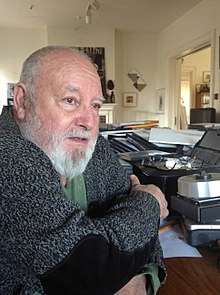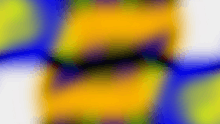Hans Breder
| Hans Breder | |
|---|---|
 Hans Breder, 2012 | |
| Born |
Hans Dieter Breder October 20, 1935 Herford, Germany |
| Died |
June 18, 2017 (aged 81) Iowa City, Iowa, United States |
| Nationality | German-American |
| Education | Hochschule für bildende Künste Hamburg in Hamburg. |
| Known for | Intermedia, Sculpture, Painting, Video art |
| Spouse(s) | Barbara Welch Breder |
Hans Dieter Breder (October 20, 1935 – June 18, 2017) was a German-American artist who lived and worked in Iowa.
Early life
Breder studied painting under Willem Grimm at the Hochschule für bildende Künste Hamburg and received a scholarship from the Studienstiftung des deutschen Volkes to study art in New York City in 1964. Once in the U.S. he worked as assistant to the sculptor George Rickey.[1]
_Hans_Breder.jpg)
_Intermedia_Performance.jpg)

Career
Breder taught as an art professor at the University of Iowa from 1966 to 2000.[2] In 1968 he founded the Intermedia program at Iowa, notable alumni include Ana Mendieta and Charles Ray.[3] Visiting Artists to the program included Hans Haacke, Allan Kaprow, Willoughby Sharp, Robert Wilson, Vito Acconci, Elaine Summers, Nam June Paik, Dennis Oppenheim, Carolee Schneemann, Karen Finley, Ben Vautier, George Kuchar, Yvonne Rainer, Trinh Minh-ha, Donald Kuspit, Roselee Goldberg, John Hanhardt, Barbara London, and many others.[4] [5][6] Breder received an Honorary Doctorate from the Technische Universität Dortmund in 2007 and retired as F. Wendell Miller Distinguished Emeritus Professor of Art in 2000.[7]
Intermedia
In an effort to create a position opposed to increased specialization and limited interdisciplinary experience, Breder proposed the Intermedia Program in the School of Art and Art History at the University of Iowa in 1967/1968 and it was approved in 1968. The focus was to be artist-oriented rather than art-oriented, in order to emphasize the belief that artistic creativity is a continual challenge. Therefore, intentionally, "no overall intermedia 'style' or philosophy is created." [8]
"My program conceived of intermedia not as interdisciplinary fusing of different fields into one, but as a constant collision of concepts and disciplines. It was performance-oriented, and video was an inherent aspect. Although initially used in a documentary mode, video almost immediately became an integral aspect of many student performances and was soon used as a medium in its own right."[9]
Breder further explained his intermedia concept in the September, 2012 issue of Artforum: "..Digital technology allows me to excavate new worlds of microcosmic event horizons. in Herodias, 2011, I aim for a dematerialization of content by entering into the microstructure of sound and imagery; I seek the immaterial or what in physics people speak of as ephemeral phenomena that cannot be reduced to mere things. The radically microcosmic experience creates an effect that is at once both abstract and real."[9]
Exhibitions
Breder's works have been presented in numerous exhibitions in the United States and internationally. He was exhibited with the Richard Feigen Gallery (1967-1972),[10] the Mitchell Algus Gallery,[11] and Hachmeister Gallery.[12] He was included in Kineticism: System Sculpture in Environmental situations, (Official Olympic Games Exhibition), University Museum of Arts and Science, Mexico City, Mexico (1968); Painting Beyond the Death of Painting: Imagistic and Abstract Work, the first group exhibition of American Art at Kuznetzky Most Exhibition Hall, Moscow, USSR (1989); An American Odyssey 1945/1980, Circolo de Bellas Artes, Madrid, Spain (2004); Ana Mendieta and Hans Breder: Converge, Lelong Galerie, New York (2008), Mind's Mirror', Ethan Cohen Gallery, New York (2014), ...Inmixing: A Survey of Works from 1964 to Present, WhiteBox, New York (2009-2010), Kollisions Felder (Collision Fields), Museum Ostwall, Dortmund, Germany (2013).[13] He was a participant in the Whitney Biennial Exhibition in 1987, 1989, and 1991. Among the institutions his work has been collected by are the Hirshhorn Museum and Sculpture Garden, Washington, D.C.; the Whitney Museum of American Art, New York City; the Walker Art Center, Minneapolis. the National Gallery of Art, Washington, D.C. His Intermedia Archive is installed permanently at the Museum Ostwall, Dortmund, Germany.[7]
Personal life
Since 1984, Breder was married to Barbara Welch Breder who lectured on the critical history of advertising and consumer culture in the University of Iowa's Department of Communication Studies for nearly three decades. She also created the Iowa City Yoga Center (1975–2000).
Breder died in Iowa City, Iowa on June 18, 2017.[14]
See also
References
- ↑ "Hans Breder CV, White Box New York" (PDF). Retrieved 2012-10-24.
- ↑ "Hans Breder Faculty Profile". Retrieved 2012-10-24.
- ↑ "Hans Breder, March 16-April 14, 2012 Text, Algus Greenspon Gallery". Archived from the original on September 23, 2012. Retrieved 2012-10-24.
- ↑ "Intermedia Visiting Artists 1969". Archived from the original on 2012-03-29.
- ↑ "INTERMEDIA A Consciousness-based Process, interview with Herman Rapaport, Performance Art Journal, 2011".
- ↑ "Hans Breder, INMIXING: A Survey of Works from 1964 – Present, ArtCAT, 2010".
- 1 2 "Breder CV, White Box New York" (PDF).
- ↑ "Statement". Archived from the original on 2008-11-21. Retrieved 2012-12-12.
- 1 2 Hans Breder, Artforum, September, 2012, Vol. 51, No. 1, p. 501
- ↑ "Intermedia, A Consciousness-based process, PAJ: A Journal of Performance and Art". Retrieved 2012-10-24.
- ↑ Cotter, Holland (July 16, 2004). "ART IN REVIEW; Hans Breder, New York Times, July 16, 2004". The New York Times.
- ↑ "Hachmeister Gallery, Hans Breder".
- ↑ "Kollisions Felder, Hans Breder, February 1, 2013-April 1, 2013" (PDF).
- ↑ Hans Breder, Who Created a New Frontier, Breaking Artistic Boundaries, Dies at 81
External links